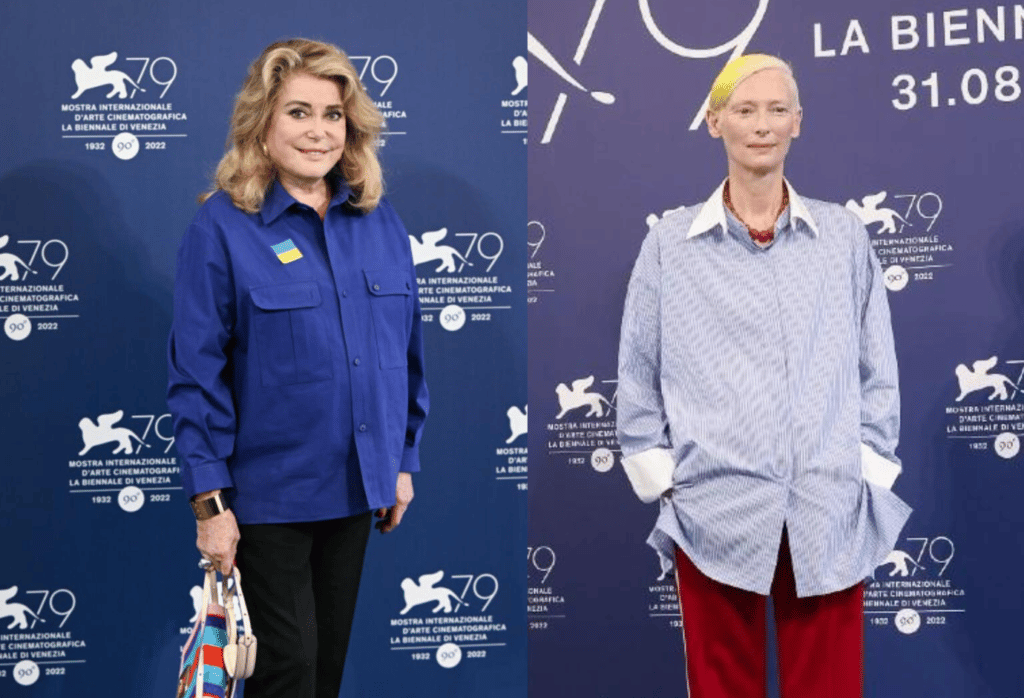Legendary actors Catherine Deneuve and Tilda Swinton have shown their support for Ukraine at this year’s Venice Film Festival, which opened last week.
Deneuve walked the red carpet and attended a press conference wearing a blue shirt with a small flag of Ukraine near a breast pocket. The 78-year old said her gesture was a demonstration of support for Ukraine, but that she would not make any comments about the war.
“I’m very aware like a lot of people and that was why I wanted to wear it for the press conference, but I don’t want to express myself because it’s worse and worse,” she told reporters. “My mind and my spirit, [is with them] every day but I don’t have any declarations to make.”
A few days later, Tilda Swinton debuted on the red carpet at the festival with bright neon yellow hair, later telling reporters, “It’s my honour to wear half of the Ukrainian flag.” She wore a blue Loewe button-up, another nod to the two-toned Ukrainian flag.
Last Wednesday, at the opening ceremony of the festival, a recorded video of President of Ukraine Volodymyr Zelenskyy was shown to guests on the festival’s Sala Grande screen, where he implored audiences “not to be silent, not to be afraid…not to remain neutral regarding the war in Ukraine.”
“Your opinion is important and your voice counts. The least that you can do – or what you should not do – is don’t be afraid. Don’t turn your back to us. Don’t go beyond. Don’t stay neutral.”
Zelenskyy said he wanted to address the film industry because “For some, power consists only in missiles and nuclear weapons; while for us power resides in philosophy, in a mentality, in reason and in words.”
“Personalities of culture: directors, producers and actors, screenwriters, cameramen, composers, artistic directors, set designers, critics and many, many more, from many countries in the world, all belonging to the same family of cinema!,” Zelenskyy said.
“I would like each country, each nation, each institution, each community in the world to clearly understand what Ukraine is currently going through.”
“We have to talk about this war with the most clear language possible: the language of cinema, the language that you all talk.”
“You will not see the tragic scenes of explosions; the shootings; the ruins with billowing smoke. The pain and the tears. You will see what the majority of people generally don’t see. An essential part of every film, a part that nobody generally notices.”
A list of 358 names of children and teens was then shown under the heading “Russia killed.”
“Names are important; they fall into obliviousness and obscurity. Because in the very moment when they appear on screen almost all spectators do only one of two things: either they get involved or they up and leave,” Zelenskyy continued.
“But I know that the first one is the most important one. The second one must not be possible.”
On September 8, the festival will demonstrate its solidarity with Ukraine by hosting a series of panel discussions, focusing on the condition of the country’s film industry.
One event will include the head of the National Cinema Institution of Ukraine, Evgeny Afineevsky, the head of the National Cinema Institute of Ukraine, Marina Kuderchuk, the representative of Ukraine’s Council for state support of cinematography, Polina Tolmacheva, and Ukrainan actress Daria Tregubova.
The speakers are set to discuss the current situation of the film industry in Ukraine, the role of artists and filmmakers; diversity in the Ukrainian audiovisual industry; and the future of Ukrainian cinematography.


